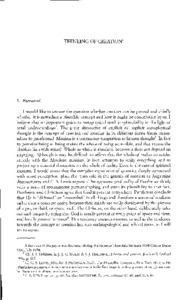Por favor, use este identificador para citar o enlazar este ítem:
https://repositorio.uca.edu.ar/handle/123456789/12920| Título: | Thinking of creation | Autor: | Campodonico, Angelo | Palabras clave: | DIOS; CREACION; EXISTENCIA DE DIOS; CRISTIANISMO | Fecha de publicación: | 1999 | Editorial: | Pontificia Universidad Católica Argentina. Facultad de Filosofía y Letras | Cita: | Campodonico, A. Thinking of creation [en línea]. Sapientia. 1999, 54 (206). Disponible en: https://repositorio.uca.edu.ar/handle/123456789/12920 | Resumen: | I would like to answer the question whether creation can be proved and chiefly whether it is nowadays a plausible concept and how it ought be conceivable by us. I believe that an important guide to metaphysical truth is «plausibility in the light of total understanding»2. The great alternative of explicit or implicit metaphysical thought is the concept of creation and monism in its different forms (from materialism to pantheism). Monism is a continuous temptation to human thought3. In fact to perceive being as being makes the whole of being accessible, and that means the absolute (in a vide sense). Whole as whole is absolute, because it does not depend on anything. Although it may be difficult to affirm that the whole of reality coincides strictly with the Absolute, monism, in fact, attempts to unify everything and to project up a material climension on the whole of reality. Even in the case of spiritual monism, I would stress that the everyday experience of quantity, deeply connected with sense perception, plays the main role in the genesis of monism as Augustine demonstrates and C. S. Lewis argues: «The apparent profundity of Pantheism thinly veils a mass of spontaneous picture-thinking and owes its plausibility to that fact. Pantheists and Christians agree that God is present every\vhere. Pantheists conclude that He is "diffused" or "concealed" in all things and therefore a universal medium rather than a concrete entity, because their minds are really dominated by the picture of a gas, or fluid, or space itself. The Christian, on the other hand, deliberately rules out such imagen by saying that God is totally present at every point of space and time, and locally present in none»4. This tendency towards monism as well as the tendency towards the concept of creation has also anthropological and ethical roots, as I will try to argue... | URI: | https://repositorio.uca.edu.ar/handle/123456789/12920 | ISSN: | 0036-4703 | Disciplina: | FILOSOFIA | Derechos: | Acceso abierto | Fuente: | Sapientia Vol. 54, No.206, 1999 |
| Aparece en las colecciones: | SAP - 1999 Vol LIV nro. 206 |
Ficheros en este ítem:
| Fichero | Descripción | Tamaño | Formato | |
|---|---|---|---|---|
| thinking-of-creation.pdf | 266,86 kB | Adobe PDF |  Visualizar/Abrir |
Visualizaciones de página(s)
39
comprobado en 27-abr-2024
Descarga(s)
35
comprobado en 27-abr-2024
Google ScholarTM
Ver en Google Scholar
Este ítem está sujeto a una Licencia Creative Commons

